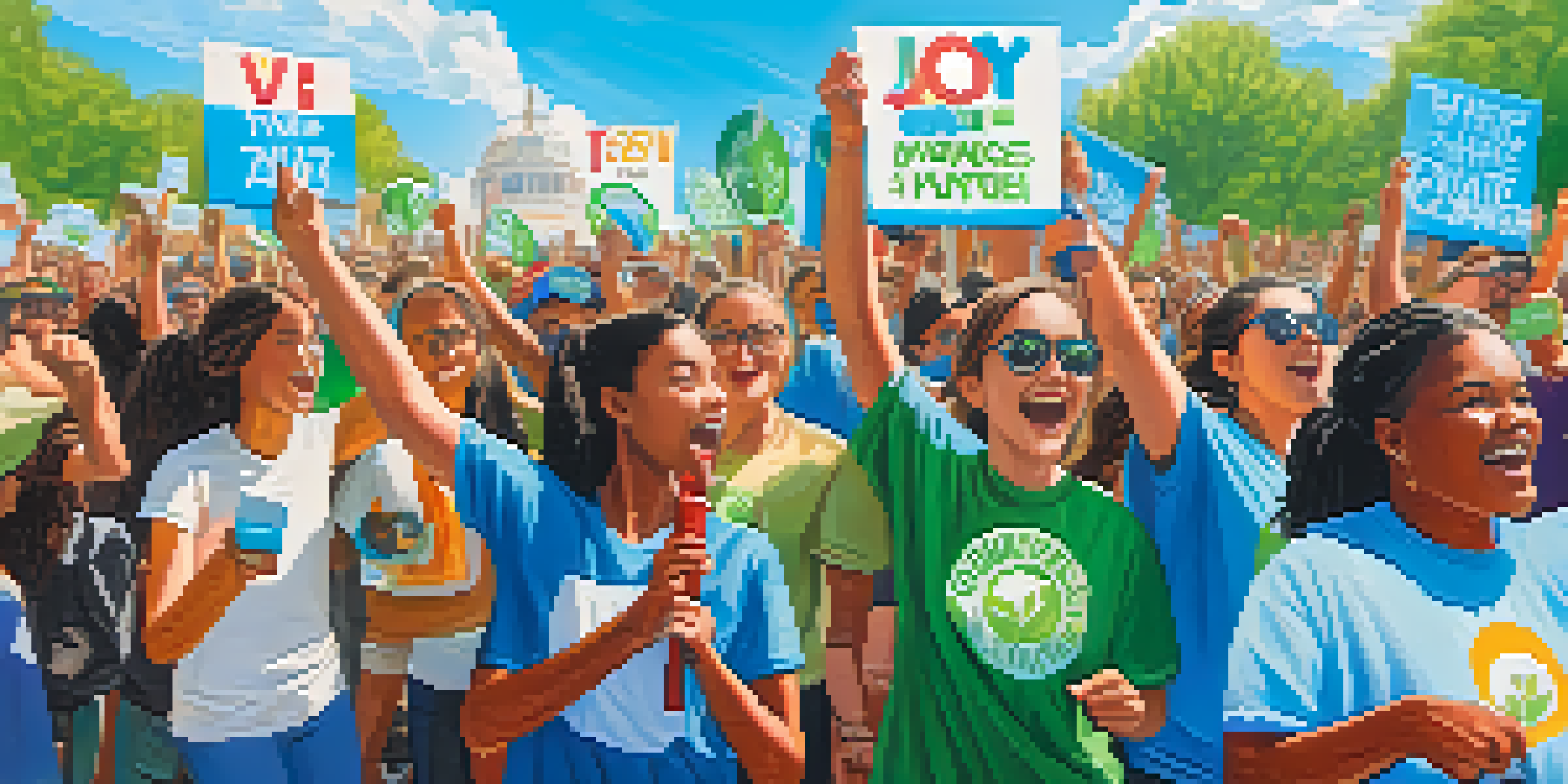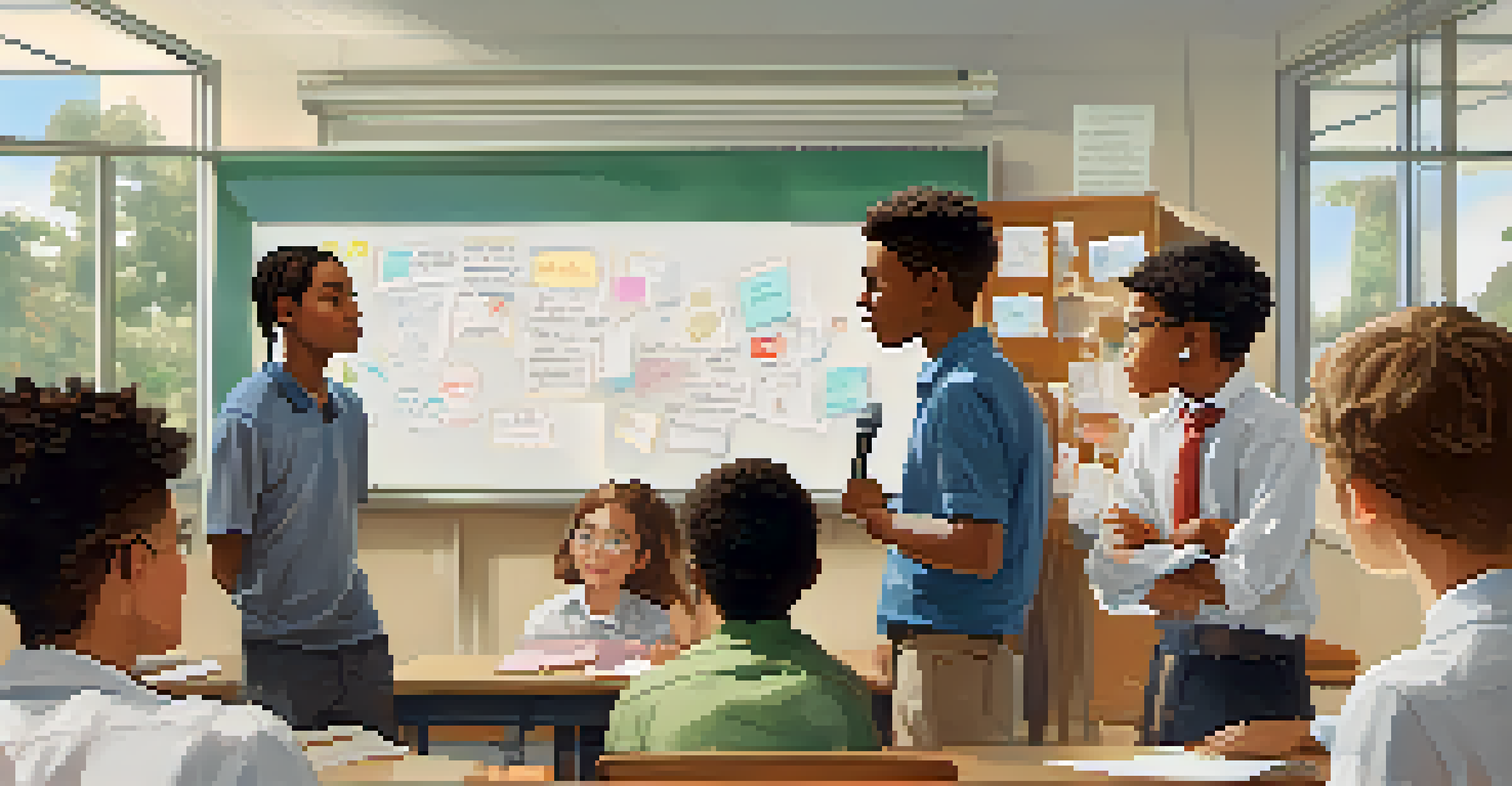Florida's Political Engagement: Youth Perspectives and Trends

Understanding the Political Landscape in Florida
Florida's political scene is as vibrant and diverse as its population. With a mix of urban and rural areas, the state showcases a variety of viewpoints and issues that resonate with its residents. This diversity is particularly evident among the youth, who are increasingly vocal about their beliefs and aspirations. From climate change to education reform, young Floridians are keenly aware of the challenges facing their communities.
In a democracy, the most important thing is to vote. It is our right to vote, and we must use it because it is our voice.
The state's political history also plays a role in shaping youth engagement. With pivotal elections and a constant influx of new residents, Florida has become a microcosm of national trends. As young people navigate this landscape, they often find themselves grappling with the complexities of party politics, social movements, and their own identities. Understanding this context is crucial to comprehending their perspectives.
Moreover, technology has transformed how young people engage with politics. Social media platforms act as both a stage and a megaphone, allowing them to share their views and organize movements. This digital landscape not only amplifies their voices but also connects them with like-minded individuals, fostering a sense of community and activism.
The Rise of Youth Activism in Florida
In recent years, there has been a noticeable surge in youth activism across Florida. High-profile events, such as the March for Our Lives movement following the Parkland shooting, have galvanized young people to take action. These movements have not only raised awareness but also encouraged civic participation among younger demographics. It's a powerful reminder that when youth unite for a cause, their impact can be significant.

This rise in activism is not limited to any one issue; young Floridians are passionate about a broad range of topics, including gun control, climate justice, and social equity. They are using their voices to advocate for change, often challenging the status quo and demanding accountability from their leaders. This blend of urgency and determination is reshaping the political landscape in Florida.
Youth Activism is on the Rise
Young Floridians are increasingly mobilizing around various social issues, demonstrating significant impact through movements like March for Our Lives.
Furthermore, youth activism is increasingly intersectional, acknowledging how various identities intersect to influence political views. This inclusivity enriches the conversation and helps ensure that the concerns of all communities are addressed. As young people continue to mobilize and express their perspectives, they are undeniably reshaping Florida's political dialogue.
The Role of Education in Political Awareness
Education plays a pivotal role in shaping political awareness among Florida's youth. Many schools have begun to emphasize civic education, teaching students about their rights and responsibilities as citizens. This foundation is crucial for fostering informed and engaged individuals who understand the importance of participation in the democratic process. However, the effectiveness of these programs can vary widely across the state.
The future belongs to those who believe in the beauty of their dreams.
Extracurricular activities, such as debate clubs and student government, also provide platforms for young people to engage with political issues. These experiences not only enhance their understanding but also build critical thinking and leadership skills. When students feel empowered to voice their opinions and advocate for change, they often carry that enthusiasm into their adult lives.
Moreover, the role of higher education cannot be overlooked. Universities in Florida often serve as hubs for political engagement, offering various resources and opportunities for students to get involved. Through campus organizations, rallies, and discussions, students are encouraged to explore and articulate their political views, forging a deeper connection to the civic landscape.
Social Media: A Double-Edged Sword for Political Engagement
Social media has revolutionized how young people engage with politics, offering both opportunities and challenges. Platforms like Twitter, Instagram, and TikTok have become essential tools for raising awareness and mobilizing support for various causes. Young Floridians use these channels to share information, organize events, and express their opinions in real time, creating a dynamic and interactive political landscape.
However, the reliance on social media also comes with drawbacks. Misinformation can spread rapidly, making it difficult for young people to discern credible sources from unreliable ones. This challenge underscores the importance of media literacy, as young voters must navigate an increasingly complex information environment. Encouraging critical thinking and responsible media consumption is vital for fostering informed political engagement.
Education Shapes Political Awareness
Civic education and extracurricular activities in schools are crucial in fostering informed and engaged citizens among Florida's youth.
In addition, the pressure to maintain a certain image online can hinder authentic political discourse. Young people may feel compelled to conform to popular opinions or trends, which can stifle genuine expression. Balancing the desire for social connection with the need for honest dialogue is an ongoing challenge for the youth in Florida's political arena.
Barriers to Political Participation for Young Floridians
Despite their enthusiasm, many young Floridians face barriers to political participation. One significant obstacle is the perception that their voices don’t matter in the grand scheme of things. This feeling of disenfranchisement can lead to apathy and disengagement, preventing them from taking an active role in the political process. Overcoming this mindset is essential for cultivating a generation of engaged citizens.
Access to resources is another challenge. Many young people may lack the necessary information or support to navigate the complexities of voting and civic engagement. This can be particularly pronounced in marginalized communities, where educational and economic disparities can limit opportunities for involvement. Addressing these gaps is crucial for ensuring that all voices are heard.
Additionally, logistical hurdles, such as transportation and scheduling conflicts, can deter young people from participating in political events or voting. Innovative solutions, like mobile voting units or flexible voting hours, could help mitigate these challenges. By creating a more accessible political environment, Florida can empower its youth to engage more fully in shaping their futures.
The Impact of Local Issues on Youth Perspectives
Local issues play a significant role in shaping the political perspectives of Florida's youth. From affordable housing to access to quality education, these concerns resonate deeply with young residents. When local issues impact their daily lives, young people are more likely to become engaged and advocate for change. This connection between personal experience and political action is a driving force behind their activism.
Moreover, local organizations and community leaders often amplify these issues, providing resources and support for young activists. By collaborating with established groups, youth can channel their energy into meaningful initiatives that address their specific concerns. This grassroots approach not only fosters a sense of ownership but also cultivates leadership skills among young Floridians.
Local Issues Drive Political Engagement
Concerns like affordable housing and quality education resonate with young people, motivating them to advocate for change in their communities.
As young people engage with local issues, they also develop a broader understanding of the interconnectedness of political challenges. For instance, addressing climate change in Florida requires considering how it affects vulnerable communities and local economies. This holistic view encourages young activists to think critically about solutions and advocate for policies that promote equity and sustainability.
Looking Ahead: The Future of Youth Political Engagement in Florida
As we look to the future, the political engagement of young Floridians is poised to evolve significantly. With each new generation, there are shifts in priorities and concerns that reflect the changing landscape of society. Climate change, social justice, and economic inequality are just a few of the issues that young people are likely to continue advocating for in the coming years. Their passion and commitment will play a crucial role in shaping Florida's political future.
Additionally, as technology continues to advance, new forms of engagement will emerge. Virtual town halls, online petitions, and interactive platforms will provide more avenues for young people to express their views and connect with policymakers. Embracing these innovations will be essential for maintaining momentum and ensuring that youth voices are not only heard but also valued in the political process.

Ultimately, the future of youth political engagement in Florida hinges on fostering a culture of inclusivity and empowerment. By encouraging open dialogue and supporting diverse perspectives, we can cultivate a generation of leaders who are equipped to tackle the challenges ahead. As young Floridians continue to engage with their communities and advocate for change, they will undoubtedly leave a lasting impact on the state's political landscape.